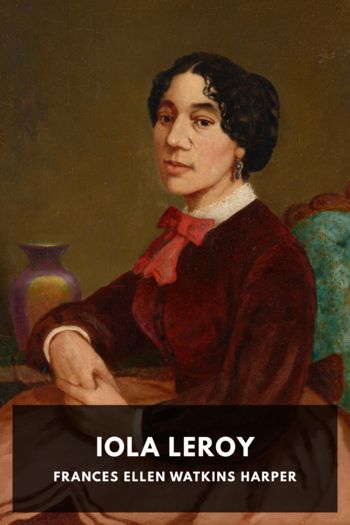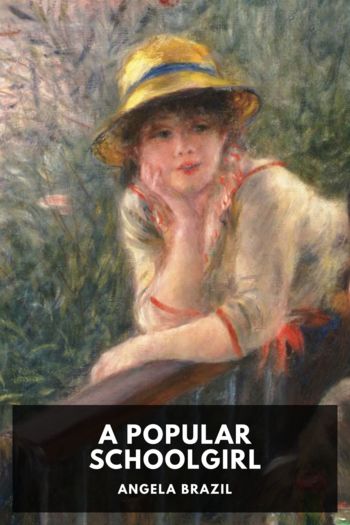Iola Leroy, Frances Ellen Watkins Harper [read aloud books .txt] 📗

- Author: Frances Ellen Watkins Harper
Book online «Iola Leroy, Frances Ellen Watkins Harper [read aloud books .txt] 📗». Author Frances Ellen Watkins Harper
“I am always glad,” said Mr. Forest, a tall, distinguished-looking gentleman from New York, “when I hear of people who are ill treated in one section of the country emigrating to another. Men who are deaf to the claims of mercy, and oblivious to the demands of justice, can feel when money is slipping from their pockets.”
“The negro,” said Hon. Dugdale, “does not present to my mind the picture of an effete and exhausted people, destined to die out before a stronger race. Gilbert Haven once saw a statue which suggested this thought, ‘I am black, but comely; the sun has looked down upon me, but I will teach you who despise me to feel that I am your superior.’ The men who are acquiring property and building up homes in the South show us what energy and determination may do even in that part of the country. I believe such men can do more to conquer prejudice than if they spent all their lives in shouting for their rights and ignoring their duties. No! as there are millions of us in this country, I think it best to settle down and work out our own salvation here.”
“How many of us today,” asked Professor Langhorne, “would be teaching in the South, if every field of labor in the North was as accessible to us as to the whites? It has been estimated that a million young white men have left the South since the war, and, had our chances been equal to theirs, would we have been any more willing to stay in the South with those who need us than they? But this prejudice, by impacting us together, gives us a common cause and brings our intellect in contact with the less favored of our race.”
“I do not believe,” said Miss Delany, “that the Southern white people themselves desire any wholesale exodus of the colored from their labor fields. It would be suicidal to attempt their expatriation.”
“History,” said Professor Langhorne, “tells that Spain was once the place where barbarian Europe came to light her lamp. Seven hundred years before there was a public lamp in London you might have gone through the streets of Cordova amid ten miles of lighted lamps, and stood there on solidly paved land, when hundreds of years afterwards, in Paris, on a rainy day you would have sunk to your ankles in the mud. But she who bore the name of the ‘Terror of Nations,’ and the ‘Queen of the Ocean,’ was not strong enough to dash herself against God’s law of retribution and escape unscathed. She inaugurated a crusade of horror against a million of her best laborers and artisans. Vainly she expected the blessing of God to crown her work of violence. Instead of seeing the fruition of her hopes in the increased prosperity of her land, depression and paralysis settled on her trade and business. A fearful blow was struck at her agriculture; decay settled on her manufactories; money became too scarce to pay the necessary expenses of the king’s exchequer; and that once mighty empire became a fallen kingdom, pierced by her crimes and dragged down by her transgressions.”
“We did not,” said Iola, “place the bounds of our habitation. And I believe we are to be fixtures in this country. But beyond the shadows I see the coruscation of a brighter day; and we can help usher it in, not by answering hate with hate, or giving scorn for scorn, but by striving to be more generous, noble, and just. It seems as if all creation travels to respond to the song of the Herald angels, ‘Peace on earth, goodwill toward men.’ ”
The next paper was on “Patriotism,” by Rev. Cantnor. It was a paper in which the white man was extolled as the master race, and spoke as if it were a privilege for the colored man to be linked to his destiny and to live beneath the shadow of his power. He asserted that the white race of this country is the broadest, most Christian, and humane of that branch of the human family.
Dr. Latimer took exception to his position. “Law,” he said, “is the pivot on which the whole universe turns; and obedience to law is the gauge by which a nation’s strength or weakness is tried. We have had two evils by which our obedience to law has been tested—slavery and the liquor traffic. How have we dealt with them both? We have been weighed in the balance and found wanting. Millions of slaves and serfs have been liberated during this century, but not even in semi-barbaric Russia, heathen Japan, or Catholic Spain has slavery been abolished through such a fearful conflict as it was in the United States. The liquor traffic still sends its floods of ruin and shame to the habitations of men, and no political party has been found with enough moral power and numerical strength to stay the tide of death.”
“I think,” said Professor Gradnor, “that what our country needs is truth more than flattery. I do not think that our moral life keeps pace with our mental development and material progress. I know of no civilized country on the globe, Catholic, Protestant, or Mohammedan, where life is less secure than it is in the South. Nearly eighteen hundred years ago the life of a Roman citizen in Palestine was in danger from mob violence. That pagan government threw around him a wall of living clay, consisting of four hundred and seventy men, when more than forty Jews had bound themselves with an oath that they would neither eat nor drink until they had taken the life of the Apostle Paul. Does not true patriotism demand that citizenship should be as much protected in Christian America as it was in heathen Rome?”
“I would have our people,” said Miss Delany, “more interested in politics. Instead of forgetting the past, I would have them hold in everlasting remembrance our great deliverance. Hitherto





Comments (0)